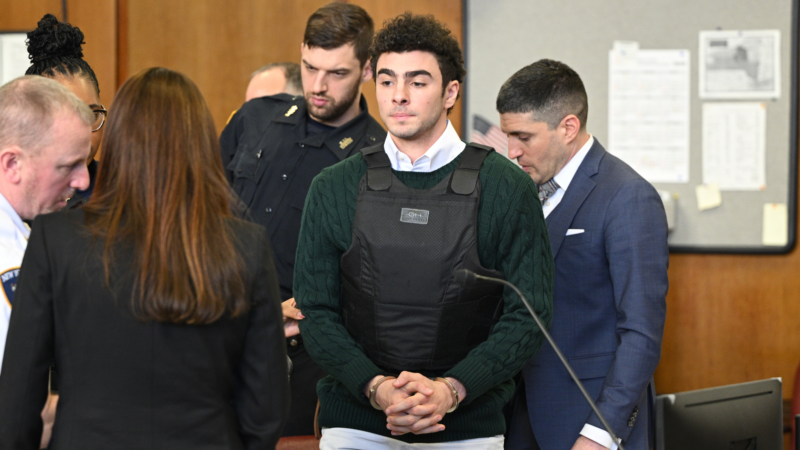In court, Luigi Mangione’s lawyer claims he was searched illegally during arrest
Luigi Mangione, the 26-year-old accused of killing UnitedHealthcare CEO Brian Thompson, had his first court appearance on Friday since he was arraigned in December on charges which include murder as an act of terrorism.
Mangione appeared in Manhattan Criminal Court handcuffed and wearing a bulletproof vest. His lawyer, Karen Friedman Agnifilo, told Judge Gregory Carro that there were “serious search and seizure issues” with her client’s arrest in Pennsylvania, and that she would seek to exclude some evidence. Gothamist reports Agnifilo also said that Mayor Eric Adams and a top NYPD official improperly discussed evidence in this case.
Though the hearing was procedural, supporters gathered outside the courthouse holding pictures of Mangione and signs saying things like, “Healthcare reform now; we are dying.”
Mangione pleaded not guilty on all counts in New York state court back in December, but has yet to enter a plea on his federal charges, which include murder. If found guilty in federal court, he could face the death penalty.
Mangione’s case has attracted worldwide attention, and sparked a national conversation about the health care system in the U.S.

Friday morning shares of UnitedHealth Group fell after reports that the Department of Justice has started investigating the company’s Medicare billing practices. This comes after its stock sank following Thompson’s death.
Mangione has received widespread public support, despite state and federal officials discouraging it. Additionally, his New York legal defense team has started a website with information about the case, how to send Mangione photographs in prison (no more than five at a time) and how to contribute to his legal defense fund, which had raised more than half a million dollars as of Friday.
His website also includes a statement from Mangione which says, “I am overwhelmed by — and grateful for — everyone who has written me to share their stories and express their support. Powerfully, this support has transcended political, racial, and even class divisions, as mail has flooded MDC from across the country, and around the globe. While it is impossible for me to reply to most letters, please know that I read every one that I receive. Thank you again to everyone who took the time to write. I look forward to hearing more in the future.”

Mangione is currently being held at the Metropolitan Detention Center in Brooklyn, and his next court date in New York is set for June, though no trial date has been set yet.
Rescuers search for survivors after ferry sinking near Bali, Indonesia
The ferry sank almost half an hour after leaving Ketapang port in the East Java town of Banyuwangi late Wednesday, bound for Bali's Gilimanuk port, a 30-mile trip.
Haiti’s gangs have ‘near-total control’ of the capital, U.N. says
An estimated 90% of the capital Port-au-Prince is now under control of criminal groups who are expanding attacks not only into surrounding areas but beyond into previously peaceful areas.
Federal judge strikes down Trump’s order suspending asylum access at the southern border
The ruling was a win for immigrant advocacy groups that sued over the president's order, which they say put thousands of lives at risk.
A Ukrainian actress saw herself in a White House video — and created one in response
Antonina Khyzhniak, who appeared in stock footage included in a White House Instagram video for the Trump administration's tax bill, responded with a humorous video — and a serious message.
CBS is the latest news giant to bend to Trump’s power
With a $16 million payment to settle President Trump's lawsuit over 60 Minutes' interview with Kamala Harris, CBS becomes the latest media outlet to bow to his power.
‘Love Island’ and modern dating: why romance is dead
This season of Love Island USA is making some viewers feel exasperated. Is it a reflection of today's dating scene?







